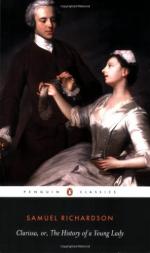Had I not made my escape when I did, I was resolved to attempt it again and again. He was gone to the Commons for a license, as he wrote me word; for I refused to see him, notwithstanding the promise he extorted from me.
How hard, how next to impossible, my dear, to avoid many lesser deviations, when we are betrayed into a capital one!
For fear I should not get away at my first effort, I had apprized him, that I would not set eye upon him under a week, in order to gain myself time for it in different ways. And were I so to have been watched as to have made it necessary, I would, after such an instance of the connivance of the women of the house, have run out into the street, and thrown myself into the next house I could have entered, or claim protection from the first person I had met—Women to desert the cause of a poor creature of their own sex, in such a situation, what must they be!—Then, such poor guilty sort of figures did they make in the morning after he was gone out—so earnest to get me up stairs, and to convince me, by the scorched window-boards, and burnt curtains and vallens, that the fire was real—that (although I seemed to believe all they would have me believe) I was more and more resolved to get out of their house at all adventures.
When I began, I thought to write but a few lines. But, be my subject what it will, I know not how to conclude when I write to you. It was always so: it is not therefore owing peculiarly to that most interesting and unhappy situation, which you will allow, however, to engross at present the whole mind of
Your unhappy, but ever-affectionate
Clarissa Harlowe.
LETTER XXII
Mr. Lovelace, to John Belford,
Esq.
Friday morning, past two o’clock.
Io Triumphe!—Io Clarissa, sing!—Once more, what a happy man thy friend!—A silly dear novice, to be heard to tell the coachman where to carry her!—And to go to Hampstead, of all the villages about London!— The place where we had been together more than once!
Methinks I am sorry she managed no better!—I shall find the recovery of her too easy a task, I fear! Had she but known how much difficulty enhances the value of any thing with me, and had she the least notion of obliging me by it, she would never have stopt short at Hampstead, surely.
Well, but after al this exultation, thou wilt ask, If I have already got back my charmer?—I have not;—But knowing where she is, is almost the same thing as having her in my power. And it delights me to think how she will start and tremble when I first pop upon her! How she will look with conscious guilt, that will more than wipe off my guilt of Wednesday night, when she sees her injured lover, and acknowledged husband, from whom, the greatest of felonies, she would have stolen herself.




